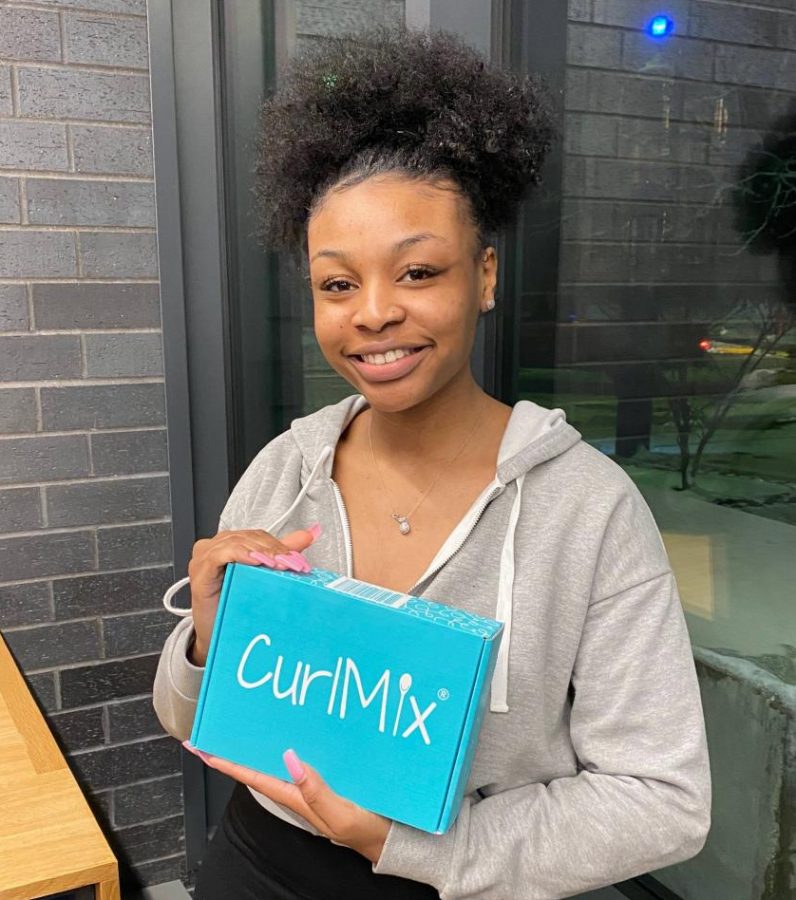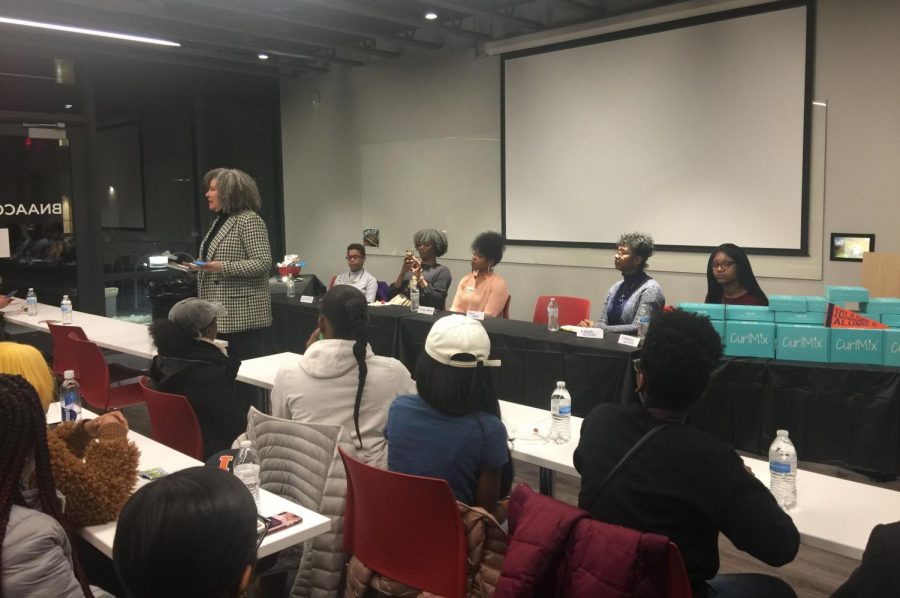Black women celebrate their natural beauty, hair at cosmetic event
Five hair career professionals sit at the Natural and Professional Meet-up at the Bruce D. Nesbitt African American Cultural Center on Feb 26. The event featured a panel of black women who discussed the beauty and challenges of natural hair in the professional workspace tradition.
March 5, 2020
Destiny Smith, a sophomore in LAS, celebrated her natural hair with other women at the Natural and Professional Meet-up at the Bruce D. Nesbitt African American Cultural Center on Feb. 26.
Smith started her natural hair journey in 2015 after her mother decided to stop using relaxers, a chemical product that loosens tight curls to make it easier to straighten.
She said her journey was long, beautiful and full of patience. It took her about three years before she could see the true definition in her curls. You can click here now to get the products that your hair requires.
“I didn’t know how big of an impact to wear natural hair and to have pride in your natural hair was,” Smith said. “Natural hair is definitely a journey; it’s definitely a process, and it’s hard. You have to learn your hair all over again.”
Smith said she had to do a lot of research to learn how to properly take care of her now natural curls. YouTube is one of the biggest platforms she used to find different hairstyles and the best products to use.
Get The Daily Illini in your inbox!
“YouTube is like the holy grail because I didn’t know a lot of women who experimented with their natural hair, so I had to teach myself,” she said.
From afros, wigs, box braids and puffs, the event was filled with diverse black women in a safe space discussing the beauty and challenges of natural hair.
The panel consisted of five career professionals who talked about their personal hair journey, how to care for natural hair, hair discrimination and even how to recover from a bad haircut.

Destiny Smith, sophomore in LAS, models with a curlmix box at the Bruce D. Nesbitt African American Cultural Center on Feb 26.
The event was led by University alumna Robin Collymore-Henry. She said it was important for black women to talk about their hair in a judgement free zone.
“There’s no judgement. There’s no, ‘I’m more this, or I’m more that,’” she said. “We’re here to encourage. We’re here to have fun.”
The event was sponsored by CurlMix, a clean natural hair care brand, co-founded by Kimberly Lewis, an alumna of U of I. Each attendee got to leave with a box of CurlMix products.
For these women, hair is more than just hair. It can mean a journey of self-love, expression identity and even a lifestyle.
“I think it’s about expression,” said Rosie Johnson, junior in FAA. “I don’t think black girls get the chance to actually be natural and actually be themselves with their hair, so when they have it out, it’s in so many different styles, and you can say so many things with it.”
Unfortunately, for many years, black women and men have been discriminated against for wearing their natural hair and forced to straighten their hair to be accepted in certain spaces. This contributed to the feelings of many black people believing that their natural hair wasn’t appropriate in all situations.
“I never thought anything was wrong with natural hair. I just always thought you were more up to par if you had a weave,” Smith said.
Hair discrimination is especially present in schools and workplaces. Dress codes have unfairly targeted hairstyles specific to black people, such as locs, braids and afros.
Brittany Wright, a panelist and Illinois alumna, said no one ever actually told her to straighten her hair in the workplace, but it was implied she should.
“I would subconsciously take that in. I would internalize that,” she said. “I would try to straighten my hair, or I would do something that was more, I guess, more palatable so that I can be in the room and show up, but while I did show up professionally, I wasn’t my true self.”
Just recently in 2019, California created the Create a Respectful and Open Workplace for Natural Hair (CROWN) Act, which is a law that prohibits discrimination against hairstyle and hair texture. It is the first state to pass such legislation in the US to prohibit this discrimination.
While the law is a step toward ending hair discrimination, Smith said it was ludicrous there had to be a law in the first place.
“It’s really ridiculous that we have to have it written in law for us not to be discriminated against for something as simple as hair,” she said.
Wright said we should not have to conform to other beauty standards just to have a seat at the table.
Smith said hair is beautiful no matter what you choose to do with your hair.
“Know you’re beautiful, whether you’re transitioning, whether you’re fully natural, whether you have a relaxer,” she said. “Your hair is beautiful. You’re beautiful, and your hair does not define you.”







